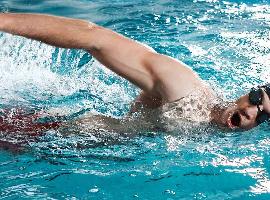 view post
view post
The Benefits of Swimming
- 2
- 0
- 2019-04-03
- By: Jane

1. Enhanced Myocardial Function
Water sports, which involve many organs and consume large amounts of energy, is accompanied with accelerated blood circulation that helps provide more nutrients for locomotive organs. Long-time swimming will lead to athletic heart syndrome, powerful cardiac contractility, increased thickness and flexibility of vascular walls, and higher cardiac output per stroke.
2. Improved Immunity
The range of pool water temperature is commonly between 26 and 28; thus, soaking in water can cause faster heat dissipation and higher energy consumption. In order to compensate for dissipated heat and to maintain a normal body temperature, nervous system will make rapid response and speed up the process of metabolism; this function can enhance human’s abilities to adapt to outside environment and to keep out the cold. People who frequently participate in winter swimming are less likely to catch cold, because swimming helps improve the temperature regulation in human bodies; additionally, by improving endocrine system functions and pituitary functions, swimming also contributes to boosting resistance to disease and immune system.
3. Weight Loss
Since water resistance and water thermal conductivity are both very high, human bodies, when soaked in water during swimming, will dissipate heat more quickly and consume more energy. Just as freshly boiled eggs cool down in air far less quickly than they do in water, exercises in water will multiply the effects of weight loss efforts. Swimming, therefore, is one of the best sports for keeping fit.
4. Bodybuilding
In swimming exercises, when people keep floating pronely or supinely on water with the help of buoyance, their bodies can get fully relaxed and stretched and muscles more streamlined; therefore, swimming will contribute to the comprehensive, balanced, and coordinated development of human bodies. Also, compared with land sports, water sports have much less impact on bones; in consequence, the possibility for bone strain to occur will be reduced, and bones and joints will be less likely to deform. Water resistance can increase the exercise intensity of swimming; yet such exercise intensity, unlike that of trainings on exercise equipment on land, is mild enough that people will be unlikely to grow stiff muscles and be able to keep flowing bodylines.
5. Strengthened Lung Function.
Human beings use lungs for breathing. The strength of lung function is determined by that of respiratory muscle function, and sports is among the most effective ways to enhance vital capacity. It has been determined that in swimming exercises, the water pressure on human’s chest is around 26.46lbs to 33.07lbs; besides, with cold water stimulating muscle contraction, people will have difficulty in breathing and, as a result, have to force breathing and increase respiratory depth, so that inhaled oxygen should be enough to meet the needs of human bodies. Swimming has so many benefits as building stronger respiratory muscles, increasing bust, enhancing vital capacity, increasing the number of alveolar used for breathing, and smoothing ventilation; for this reason, it is highly beneficial to health.
6. Skin Care
In swimming, the water washes skin, sweat glands, and fat glands; similar to a message, this process helps accelerate blood circulation and make the skin smoother and more elastic.




